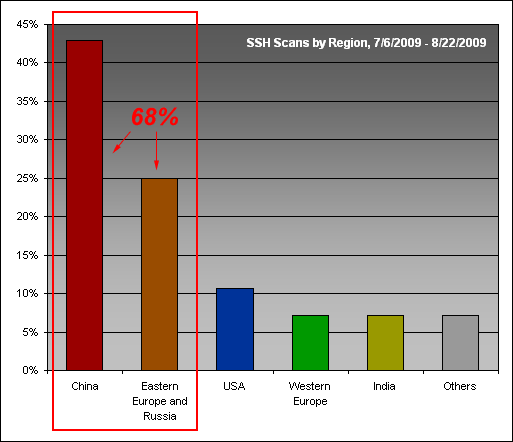Let’s have a look at who’s been trying to break into SSH service on my development server recently, and where in the world they’re attacking from. Since I implemented fail2ban to trap out these attempted dictionary attacks, it’s logged the network addresses of all the culprits. Here’s who got caught in recent activity:
2009-07-06 19:41:21,425 fail2ban.actions: WARNING [ssh] Ban 83.15.85.210 2009-07-08 13:48:43,565 fail2ban.actions: WARNING [ssh] Ban 87.229.101.170 2009-07-10 10:59:36,625 fail2ban.actions: WARNING [ssh] Ban 211.155.227.18 2009-07-14 00:12:49,866 fail2ban.actions: WARNING [ssh] Ban 202.109.242.18 2009-07-16 05:14:16,456 fail2ban.actions: WARNING [ssh] Ban 89.207.64.170 2009-07-17 01:34:32,566 fail2ban.actions: WARNING [ssh] Ban 91.83.48.226 2009-07-17 06:47:01,616 fail2ban.actions: WARNING [ssh] Ban 202.96.199.150 2009-07-21 04:22:42,195 fail2ban.actions: WARNING [ssh] Ban 80.190.191.124 2009-07-21 06:33:19,415 fail2ban.actions: WARNING [ssh] Ban 200.52.194.36 2009-07-25 00:26:18,623 fail2ban.actions: WARNING [ssh] Ban 222.68.194.69 2009-07-26 00:20:16,743 fail2ban.actions: WARNING [ssh] Ban 222.68.194.69 2009-07-27 22:43:14,553 fail2ban.actions: WARNING [ssh] Ban 80.88.248.30 2009-07-28 13:54:37,653 fail2ban.actions: WARNING [ssh] Ban 72.44.174.162 2009-07-29 01:52:28,733 fail2ban.actions: WARNING [ssh] Ban 218.16.224.203 2009-07-29 19:41:58,923 fail2ban.actions: WARNING [ssh] Ban 125.208.3.9 2009-07-30 13:39:40,597 fail2ban.actions: WARNING [ssh] Ban 94.89.83.58 2009-08-01 09:57:49,727 fail2ban.actions: WARNING [ssh] Ban 80.86.201.29 2009-08-02 06:38:09,777 fail2ban.actions: WARNING [ssh] Ban 173.45.241.236 2009-08-02 14:47:14,147 fail2ban.actions: WARNING [ssh] Ban 124.124.9.43 2009-08-07 23:35:22,597 fail2ban.actions: WARNING [ssh] Ban 202.109.242.18 2009-08-12 20:06:36,877 fail2ban.actions: WARNING [ssh] Ban 222.242.186.83 2009-08-13 19:01:42,967 fail2ban.actions: WARNING [ssh] Ban 85.115.100.144 2009-08-13 22:27:14,007 fail2ban.actions: WARNING [ssh] Ban 98.112.35.38 2009-08-14 01:32:15,057 fail2ban.actions: WARNING [ssh] Ban 219.237.197.158 2009-08-14 09:31:25,117 fail2ban.actions: WARNING [ssh] Ban 81.200.21.26 2009-08-16 12:12:31,627 fail2ban.actions: WARNING [ssh] Ban 221.233.134.124 2009-08-20 19:50:08,877 fail2ban.actions: WARNING [ssh] Ban 202.107.209.35 2009-08-22 12:20:31,127 fail2ban.actions: WARNING [ssh] Ban 115.108.25.2
That’s 28 attacks over the course of 48 days, originating from 26 different hosts (two were repeat offenders).
Digging through the regional Whois registries, we can discover the geographic locations of the network segments on which these remote IP addresses were assigned, and the names of the network operators:
IP address Registry Registrant, Location 83.15.85.210 RIPE Bielany Wroclawskie, Warsaw, Poland 87.229.101.170 RIPE Polgarhaz Holding Kft., Budapest, Hungary 211.155.227.18 APNIC Netli.lic., Hangzhou, China 202.109.242.18 APNIC China Telecom, Fujian Province, China 89.207.64.170 RIPE Joint Stock Company Svyazist, Kstovo, Russia 91.83.48.226 RIPE Inest Hosting, Szeged, Hungary 202.96.199.150 APNIC China Telecom, Shanghai Province, China 80.190.191.124 RIPE IP Exchange GmbH, Nuremberg, Germany 200.52.194.36 LACNIC MegaCable SA de CV, Guadalajara, Mexico 222.68.194.69 APNIC China Telecom, Shanghai Province, China 80.88.248.30 RIPE 2Connect WLL, Manama, Bahrain 72.44.174.162 ARIN ATX Telecom Services, King Of Prussia, PA, USA 218.16.224.203 APNIC China Telecom, Guangdong Province, China 125.208.3.9 APNIC Beijing Primezone Technologies, Beijing, China 94.89.83.58 RIPE Tendensia SRL, Castellaneta, Italy 80.86.201.29 RIPE Green.ch AG, Brugg, Switzerland 173.45.241.236 ARIN Slicehost LLC, St. Louis, MO, USA 124.124.9.43 APNIC Reliance Communications Ltd, Mumbai, India 222.242.186.83 APNIC China Telecom, Hunan Province, China 85.115.100.144 RIPE Sia "Pronets", Riga, Latvia 98.112.35.38 ARIN Verizon DSL, San Fernando, CA, USA 219.237.197.158 APNIC Jin'Ou Building, Beijing, China 81.200.21.26 RIPE SU29 Telecom, Moscow, Russia 221.233.134.124 APNIC China Telecom, Hubei Province, China 202.107.209.35 APNIC Ningbo Education Science Ctr, Zhejiang, China 115.108.25.2 APNIC TATA Communications, Mumbai, India
The named registrants are network owners and operators, usually local ISPs, who of course represent non-complicit intermediaries and not the attackers themselves. But these records do accurately reflect the geographic locations of the remote hosts from which the intrusion attempts originated. The listed country, at a minimum, is very reliable; IP geolocation by country with Whois should be over 95% accurate.

There’s no mistaking that these attacks tend to originate from China and the former Soviet bloc. These areas are home to bustling cybercrime industries. Attackers seek to expose financial accounts presumed stored on servers, or to commandeer staging grounds for use in the infiltration of other lucrative targets.
This is just a tiny sample of all attack activity, being just one sensor on one port, on one host, on one network segment of the great wide internet that hackers direct their tools against. Attacks of this type and others, many of which are much more commonplace than SSH scans, originate from this same geographical profile.
How are you defending your network and data from these threats? Do you know about techniques for reducing your exposure? Let’s talk.
Resources
China: Hacker Schools Become Big Business
China View: Training for hackers stirs worry about illegal actions
BlackHat USA 2009: Russian’s Organized Crime Heritage Paved Way For Cybercrime

